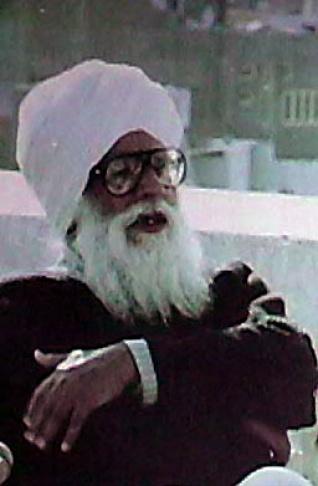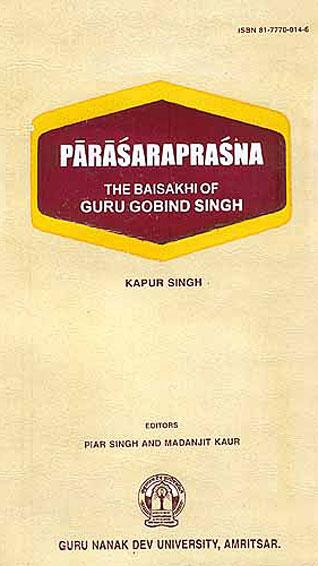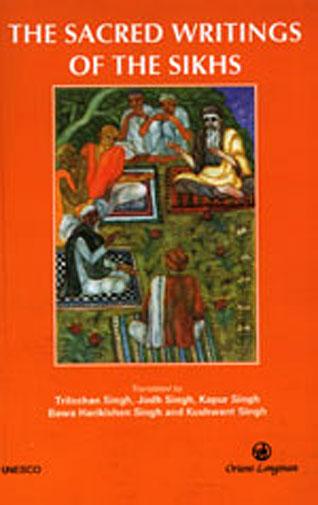
Above and below: Sirdar Kapur Singh. Homepage image - Kapur Singh is on the far-right, with Giani Gurdit Singh, Sardar Hukam Singh, Bhai Ashok Singh, Bhai Ardaman Singh of Bagrian, Sardarni Inderjit Kaur, et al.



Our Heroes
Kapur Singh:
Maker of History
by Major Gurmukh Singh
Today - March 2, 2009 - marks the Birth Centenary of Bhai Sahib Sirdar Kapur Singh, a towering figure in both Sikh polity and Letters during much of the Twentieth Century.
Sirdar Kapur Singh (1909-1986) - civilian, parliamentarian and intellectual, was a master of many-sided erudition. Besides Sikh theology, he was vastly learned in philosophy, history and literature.
He was born into a farming family at the village Chakk in Ludhiana district on March 2, 1909. His father's name was Didar Singh.
Kapur Singh attained the rank of "First Class First" when he received his Master's Degree at the prestigious Government College, Lahore. He then went on to Cambridge, England to take his Tripos in Moral Sciences.
He was a distinguished linguist and had mastered several of the languages of the East and the West. Besides English, which he could spin around his fingers with extraordinary finesse and subtlety, he was fluent in Persian, Arabic and Sanskrit.
In addition to these, he had easy acquaintance with such discreet fields as astrology, architecture and space science. But, in spite of his knowledge covering many disparate areas, Kapur Singh's principal focus in his life work remained on Sikh literature and theology.
He was widely known to be a stickler for accuracy of fact and presentation. He stood up foursquare to any misrepresentation or falsification of any shade of Sikh thought and belief. He was most vigilant and unbending in this respect.
He was selected for the elite Indian Civil service, and served in a number of senior administrative posts. In 1947, for example, he was appointed Deputy Commissioner - the top Government bureaucrat of the region - of Kangra.
Shortly after India won independence, while in this role, he became aware of - and irked by - the increasingly narrow policies of the new Indian Government and its bias against Sikhs.
What particularly incensed him was a circular dated October 10, 1947, issued by the Governor of the State, Chandu Lal Trivedi, warning district authorities in the Punjab against what was described as the "criminal tendencies of the Sikh people"!
Deputy Commissioner Kapur Singh immediately filed a strong protest against this wild and mischievous slur, thus inviting the Governor's personal wrath upon himself.
Charges were promptly brought against Kapur Singh for "insubordination" and he was dismissed from the service.
Thereafter, Kapur Singh became an ardent supporter of the Akali demand for a Punjabi-speaking state [along the lines of other Indian states, which had been carved on linguistic lines to accord protection for the respective languages and cultures.]
After a stint as Professor of Sikhism under the aegis of the Akal Takht, he joined active politics.
In 1962, he was elected to the Lok Sabha of the Indian Parliament - India's "House of Commons".
In 1969, he ran for and was elected to the Punjab Vidhan Sabha - the State Legislative Assembly.
Kapur Singh made a mark during this period through his forthright speech and as an unrelenting critic of the government's policies, especially in the area of the rights of India's Sikh minority.
As a leading Sikh ideologue, he was the moving spirit behind the Anandpur Resolution, which was adopted by the Shiromani Akali Dal in 1973 and, like several other of his pronouncements, became a crucial enunciation of modern Sikh political policies and aspirations.
A very stirring Sikh document of the modern period was the Presidential Declaration at the Hari Singh Nalva Conference convened at Ludhiana on July 14, 1965.
Although his authorship was nowhere specified - as was the case with all important Sikh political or intrinsically seminal documents of this period - the document clearly bore the imprint of Kapur Singh's penmanship. It said:
1. This Conference, in commemoration of General Hari Singh Nalva of historical fame, reminds all concerned that the Sikh people are makers of history and are conscious of their political destiny in a free India.
2. This Conference recalls that the Sikh people agreed to merge in a common Indian nationality on the explicit understanding of being accorded a constitutional status of co-sharers in the community, which solemn understanding now stands cynically repudiated by the present rulers of India.
Further, the Sikh people have been systematically reduced to a sub-political status in their homeland, the Punjab, and to an insignificant position in their motherland, India.
The Sikh people are in a position to establish before an impartial international tribunal, uninfluenced by the current Indian rulers, that the law, the judicial process, and the executive action of the State of India is consistently and heavily weighted against the Sikhs and is administered with unbandaged eyes against Sikh citizens.
3. This conference, therefore, resolves after careful thought, that there is left no alternative for the Sikhs in the interest of self-preservation but to frame their political demand for securing a self-determined political status within the Republic of Union of India.
The author's name is not mentioned, but it is clearly the handiwork of Kapur Singh. The Shiromani Gurdwara Parbandhak Committee's publication at the time of the Nirankari attack on the Sikhs a decade and a half later, is described thus:
THEY MASSACRE SIKHS:
A White Paper
By
The Sikh Religious Parliament (SGPC)
Sirdar Kapur Singh, besides being an extraordinarily learned man, was a prolific writer.
In addition to his Parasaraprasna,* in English, which ranks as a classic on Sikh philosophy, his other works include:
Hashish (Punjabi Poems)
Saptasring (Punjabi Biographies)
Bahu Vistaar (Punjabi Essays)
Pundrik (Punjabi Essays on Culture & Religion)
Mansur al-Hallaj (Monograph on a Sufi Saint)
Sacchi Saakhi (Memoirs)
The Sacred Writings of the Sikhs (a UNESCO publication)
Me Judice (English Miscellany)
Sikhism for Modern Man
Contributions of Guru Nanak
The Hour of Sword
Guru Arjan and His Sukhmani
Sirdar Kapur Singh died after a protracted illness at his village home in Jagraon in Ludhiana district on August 13, 1986, at the age of 77.
* For an excellent review of Kapur Singh's Parasaraprasna by Manjyot Kaur, please click on: http://sikhchic.com/article-detail.php?id=397&cat=12
[Courtesy: The Encyclopaedia of Sikhism, Editor-in-Chief - Harbans Singh]
March 2, 2009
Conversation about this article
1: Raj (Canada), March 02, 2009, 10:46 PM.
I've read few of Sardar Kapur Singh's books, but "Sacchi Saakhi" is a most authentic account of history, especially of the betrayal by the new rulers o India. And it sheds light on how ill-prepared the Sikh leadership was. The British, knowing and having experienced Sikh martial qualities, had a very high regard for Sikhs. They offered an independent State to the Sikh with their choice of boundaries, but our leaders refused to be "divided". Mohd. Ali Jinnah had offered them an area covered by all the Sikh princely states as Sikh land, but again, Master Tara Singh could not wait 10 extra minutes in Lahore for Jinnah who was running late that day. Imagine, those 10 minutes causing virtual extinction of us in our homeland. There're hundreds of these examples in that book. In my opinion, every Sikh should read it.
2: Satvir Kaur (Boston, U.S.A.), March 03, 2009, 2:20 AM.
I've read 'Sacchi Saakhi' by S. Kapur Singh and am totally impressed by his personality. I consider this book an unbiased and accurate account of the politics of the time. It is a hard read but a recommended one.
3: Roopinder Singh (Chandigarh, Punjab), March 03, 2009, 3:56 AM.
Sirdar Kapur Singh ICS, was a great man, much talented and interesting. He was a friend of my parents, Giani Gurdit Singh and Sardarni Inderjit Kaur, and he would often drop in at our home, whether it was in Chandigarh, Patiala, Amritsar or Delhi. A memorable early encounter with him was at Patiala, where my mother was Principal, Government College for Women. I was a sixth grade student and my parents had gone out for a walk. Sirdar Sahib came in fuming and said: " ... these scoundrels, they dare call Guru Sahib cyclothymic". I asked him what the word meant, at which his ire shifted to me. I was unlettered and worse! I was told to fetch a dictionary and look it up. I looked up the biggest dictionary that we possessed and found that the word meant someone who had major mood swings. Thus, I was educated by the Great Sirdar, and as soon as my parents arrived, I fled. I also gravitated to him. He would often call for me when he came home. The photograph on the home page was taken at our home in Amritsar, when my mother was Principal, Government College for Women, and everyone in the picture had gathered for a funciton of the Sri Guru Singh Sabha Shatabdi Committee, of which Sardar Hukam Singh, former Speaker of the Lok Sabha, was the President and my father, Giani Gurdit Singh, the General Secretary. Sirdar Kapur Singh insisted he was 'Sirdar', and not 'Sardar'. He was always lucid, and I owe a lot of my interest in Sikhi to his encouragement. I loved the way he would draw upon various traditions to make his point, and the felicity with which he moved from one language to another, be it Punjabi, Hindi, Sanskrit, Persian or English. While immensely knowledgeable, he was equally at ease in the rarefied scholarly atmosphere as well as earthy sentiments of rural Punjab. Chandigarh was his home for many years, with interludes in Delhi, but it was to his village that he went when his end was near, lovingly cared for by his elder brother and his family. His great contribution to the community has not been documented well ... it should be.
4: G. Singh (U.K.), March 03, 2009, 3:27 PM.
An amazing writer and thinker, but don't forget the other side of it; he was responsible for making paranoia amongst Sikhs fashionable. He was the intellectual predecessor to Sant Bhindranwale.
5: Pal Singh (U.K.), March 03, 2009, 3:32 PM.
If all Sikhs were to understand and implement a single chapter of Kapur Singh's Parasaraprasna in their socio-political lives, we would be best placed to put into practice the Anandpur Sahib Resolution. Hail, Kapur Singh!
6: Jessie Parmar (Lethbridge, Alberta, Canada), March 05, 2009, 2:51 AM.
Thank you very much for writing about our beloved and astute leader. He was - and is - a mentor for Sikh youth, and a real sant-sipahi!
7: Meena (Delhi, India), September 19, 2009, 3:03 AM.
G. Singh ji (U.K.) - an unnecessary and petty comment by you on a great man! Perhaps if you take the time to do some reading rather than accept the propaganda dished out by the Indian government, you will find that it was not S. Kapur Singh or Sant Jarnail Singh Bhindranwale who were paranoid but rather the Indian government as exemplified in the excess actions they have taken to eradicate the Sikhs, their spirit and their religion!
8: Gur Rattan Pal Singh (Chandigarh, Punjab), October 31, 2010, 2:50 AM.
"Listening to Sirdar Kapur Singh was an education, talking to him was a folly and arguing with him was a sin."
9: Gursahib Singh Bhullar (India), August 20, 2013, 11:58 AM.
I am speechless when I read about Sirdar Kapur Singh ji. I think he was a noble soul who sacrificed his all for Sikhi.
10: Gursharan Singh (Christchurch, New Zealand), October 27, 2013, 3:43 AM.
Sirdar Kapur singh was a great thinker of history and the present state of the Sikh mind. The Sikh quom is missing you, Sirdar Sahib.
11: Heera Singh (Barnala, Punjab), November 06, 2013, 4:35 AM.
A real hero of the Sikh nation: Sirdar Kapur Singh.
12: Varinder Singh (London, United Kingdom), July 27, 2014, 5:32 AM.
Roopinder Singh ji, what was the reason Kapur Singh wanted to be known as Sirdar instead of Sardar? What is the difference between the two terms?
13: Kamaljit Singh (Delhi, India), August 19, 2014, 3:34 AM.
I wish that the book or at least the conclusion of the book should be given to Sikhs so that a common Sikh should understand the seed of discrimination sown by the Hindu fanatics and why Sardar Jarnail Singh Khalsa sacrificed his life for the Sikhs.


